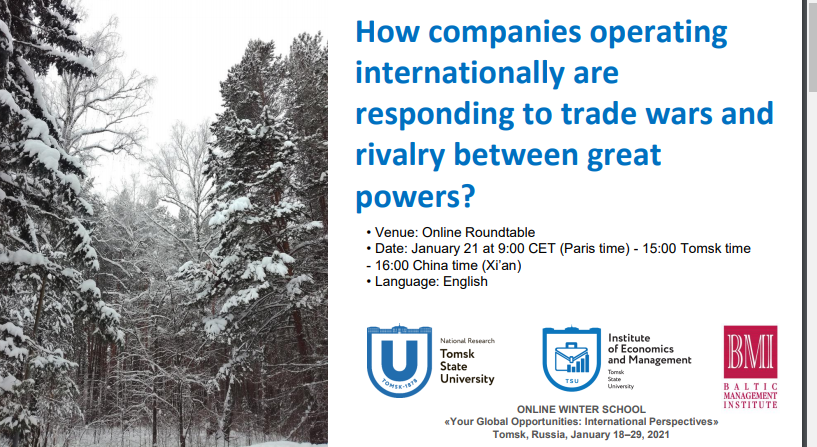
Governments’ conflicts and trade wars: world experts took part in the round table of the Management Winter School
On January 21, as part of the IEM winter online school “Your Global Opportunities: International Perspectives”, an international round table was held on the topic: “How do international companies react to trade wars and rivalry between countries?”. Scientists from Tomsk State University and international partners of the Institute took part in it.
Among the experts were:
- M. Gaston Khoury, Independent Senior Advisor, Digital Specialist, Former Vice President of Sales, Huawei Western Europe;
- Prof. Jean-Paul Larçon, Distinguished Professor of International Management at HEC (Paris) and co-chairman of BMI (Vilnius, Brussels). Member of the Board of Trustees of Economics and Management of TSU.
- Prof. Pierre Semal, Professor of Supply Chain and Operations Management at the Louvain School of Management (Belgium)
- Prof. Alain Dumont, Strategic Advisor, Professor of International Business at Tulane Global MBA and BMI University (Vilnius, Brussels)
The focus was on a set of questions about how international companies respond to new forms of protectionism, economic and technological rivalry. The meeting was attended by over 40 participants, bachelors and masters students of TSU and other universities, and students from China.
Jean-Paul Larson's speech was devoted to the rivalry and economic differences between China and the United States, the economic "wall" between countries, export controls, and sanctions.
- This situation is very sensitive for international companies because they are in the global ecosystem, - said the professor.
He added that, due to the election of a new president and changes in the economy, companies will have to adapt to new realities. Perhaps we will not talk about deglobalization, but about regionalization and the concentration of companies around large economic blocs.
Professor Pierre Semal, in turn, talked about how trade wars affect supply chain prospects. He noted that a growing market presupposes, on the one hand, an increase in the number of consumers, a wider range of resources, but at the same time, greater risks associated with political stability or its volatility, disruption (processes of creative destruction), pricing, availability of resources, time (which can be expressed in delivery delays, problems with transfers, and others.). His main point was that flexibility should remain a key factor in supply chain management.
Professor Alain Dumont shared his opinion on the functioning of multinational companies in the era of protectionism. He put the term "slowbalisation" on the title page of the presentation. With this headline in 2019, The Economist was published. The authors of the article believe that the new model of international trade is taking on more and more clear outlines, and the costs associated with this difficult process are already obvious. The Economist states: China is slowing down, and of course, Western companies dependent on China, such as Apple, Huawei, have been hit. As a cross-border investment, trade, bank loans, and supply chains shrank, it must be admitted that globalization has given way to a new era of stagnation - slowbalisation. It will lead to the strengthening of ties within regional blocs. Distribution chains in North America, Europe, and Asia are increasingly tied to nearby suppliers. In Europe and Asia, a large share of trade is becoming intraregional, a trend that has only intensified since 2011.
Among the experts were:
- M. Gaston Khoury, Independent Senior Advisor, Digital Specialist, Former Vice President of Sales, Huawei Western Europe;
- Prof. Jean-Paul Larçon, Distinguished Professor of International Management at HEC (Paris) and co-chairman of BMI (Vilnius, Brussels). Member of the Board of Trustees of Economics and Management of TSU.
- Prof. Pierre Semal, Professor of Supply Chain and Operations Management at the Louvain School of Management (Belgium)
- Prof. Alain Dumont, Strategic Advisor, Professor of International Business at Tulane Global MBA and BMI University (Vilnius, Brussels)
The focus was on a set of questions about how international companies respond to new forms of protectionism, economic and technological rivalry. The meeting was attended by over 40 participants, bachelors and masters students of TSU and other universities, and students from China.
Jean-Paul Larson's speech was devoted to the rivalry and economic differences between China and the United States, the economic "wall" between countries, export controls, and sanctions.
- This situation is very sensitive for international companies because they are in the global ecosystem, - said the professor.
He added that, due to the election of a new president and changes in the economy, companies will have to adapt to new realities. Perhaps we will not talk about deglobalization, but about regionalization and the concentration of companies around large economic blocs.
Professor Pierre Semal, in turn, talked about how trade wars affect supply chain prospects. He noted that a growing market presupposes, on the one hand, an increase in the number of consumers, a wider range of resources, but at the same time, greater risks associated with political stability or its volatility, disruption (processes of creative destruction), pricing, availability of resources, time (which can be expressed in delivery delays, problems with transfers, and others.). His main point was that flexibility should remain a key factor in supply chain management.
Professor Alain Dumont shared his opinion on the functioning of multinational companies in the era of protectionism. He put the term "slowbalisation" on the title page of the presentation. With this headline in 2019, The Economist was published. The authors of the article believe that the new model of international trade is taking on more and more clear outlines, and the costs associated with this difficult process are already obvious. The Economist states: China is slowing down, and of course, Western companies dependent on China, such as Apple, Huawei, have been hit. As a cross-border investment, trade, bank loans, and supply chains shrank, it must be admitted that globalization has given way to a new era of stagnation - slowbalisation. It will lead to the strengthening of ties within regional blocs. Distribution chains in North America, Europe, and Asia are increasingly tied to nearby suppliers. In Europe and Asia, a large share of trade is becoming intraregional, a trend that has only intensified since 2011.
